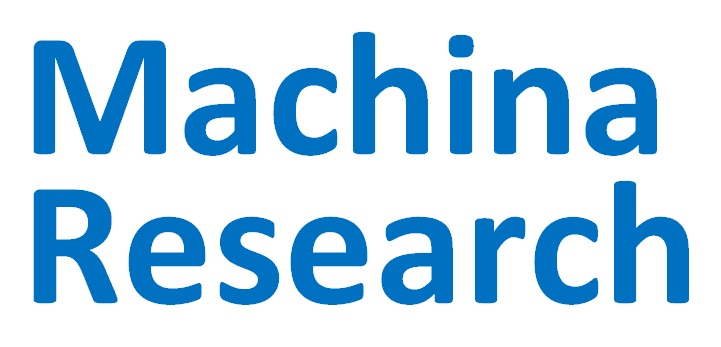 Machina Research Director Matt Hatton and I talked about Connected Cars as a vertical sector of M2M (Machine to Machine). The DIDX-sponsored Machina Research audio podcast is available for listening. Mr. Hatton explained who the Connected Cars "players" are such auto manufacturers and the companies that make the hardware and software that reside on the vehicles. Machina Research talks with those companies and also with the companies who provide advice to companies that actually provide the networks (mobile operators).
Machina Research Director Matt Hatton and I talked about Connected Cars as a vertical sector of M2M (Machine to Machine). The DIDX-sponsored Machina Research audio podcast is available for listening. Mr. Hatton explained who the Connected Cars "players" are such auto manufacturers and the companies that make the hardware and software that reside on the vehicles. Machina Research talks with those companies and also with the companies who provide advice to companies that actually provide the networks (mobile operators).The following is a transcript of our conversation beginning with my request for Matt Hatton to give us his thoughts on current Connected Cars industry trends and what kinds of cool concepts and experiences we might expect in the future.
Suzanne Bowen:
So, now it's clear what Machina Research does and who they work with. How about your thoughts on industry trends, maybe your unique insights and opinions you have about the Connected Cars industry moving forward? What is in the future?
Matt Hatton:
Well, it's almost all about the future. Right? When we come to connected cars ... there has been some adoption so far. We've seen some serious numbers from the likes of GM with OnStar and with Connected SatMap ... stolen vehicle recovery and free telematic solutions, but the potential is just only being tapped now. If you look at the auto OEM, increasingly they see this as a critical, as being a must have ...
Spent a lot of time over the last couple of months speaking with auto OEMs. What comes through in those discussions is that it is a must-have now. The connectivity is an essential part. The speed at which you move toward that connected car as an OEM and maybe the approach may depend on your typical target market. If you are aiming squarely at what might have been described once as Generation X or Y, people who are used to being connected all the time, then inevitably your product will be need to be connected.
If your product is for mass market, the approach might be a little slower and a little bit different, but the direction of travel is, pardon the pun, is pretty obvious. We're moving towards the world of the Connected Car. Anticipation is that by 2025, about 90 % of vehicles will have some form of connectivity.
Some of this is driven by regulation, so you've got ECALL in the European Union. You have GLONASS in Russia and CONTRAN 245 in Brazil and a variety of other regulations. That's pushing some connectivity, but a lot of it is driven by the auto manufacturers themselves as they seek to build a closer relationship with their customers to meet that requirement for connectivity and drive some additional revenue stream.
One auto manufacturer ... not sure I can name who because I suspect we were told in confidence about this, but they did a survey of what the main key drivers were for ... again another pun ... most impossible to avoid when you are talking about the auto industry. The top three issues when picking a car ten years ago ... traditional things of performance, style and so forth. Just last year, they found that connectivity and issues associated came in at number two in the requiremnts for their particular set of customers. Now, they were a higher end market. Possibly that is the reason for that.
In a world where there is an awful lot to distinguish a set of vehicles and if you were to be uncharitable, you would say that. Connectivity becomes an issue. It is illustrative the fact that we're getting more and more interested in having this sort of connected vehicle. One of the big interesting areas is that it is not just about taking the existing way you drive and adding some connectivities like you can keep track of Facebook or Twitter. It's nice to be able to use Google Local Search when you are driving around, but one of the more fundamental things it does is that connectivity provides a potential shift in business model.
Take something like a Zipcar. http://www.zipcar.com/ Those kinds of companies are really enabled by connectivity, so you are allowing people the freedom to own a car or not own a car ... to make use of shared vehicles. For me, these new business models are more interesting perhaps because the creation of a smart phone on wheels which is what we tend to think about the Connected Car.
Suzanne Bowen:
Interesting. This is going to open up some conversation, I'm sure.
Matt Hatton:
I hope so. I certainly hope so.
Suzanne Bowen:
I know that Machina Research is participating in Connected Cars which is colocated with what is practically the world's largetst LTE event, the LTE World Summit. I believe it is June 25 - 26, 2013 in Amsterdam. Would you tell us what you guys will be doing there?
Matt Hatton: 
We are going to be chairing day two at the Connected Car Summit. Lots of interesting participants such as OEMs and mobile operators and a variety of others. We are also participating in the World Summit itself. I am sitting on a panel at that event as well.
It is quite interesting that the two are being colocated. I think it is appropriate. When you talk about connecting vehicles ... increasingly you are talking about LTE. For a couple of reasons ... for one ... for the bandwidth requirement ... not the major one but mostly for the future-proofing I would say is the big driver. We are heading towards an LTE future.
If you are expecting these vehicles to be using these services for the next ten years, then you need a technology that is going to be around for that period of time. It is very possible that 2G and 3G will be, but certainly LTE will be.
Suzanne Bowen:
Good points. Thank you, Matt Hatton, for talking with us and we look forward to seeing your company at Connected Cars in June 2013 in Amsterdam.
Matt Hatton:
My pleasure. Thanks, Suzanne.




-thumb-100x100-11946.jpg)








